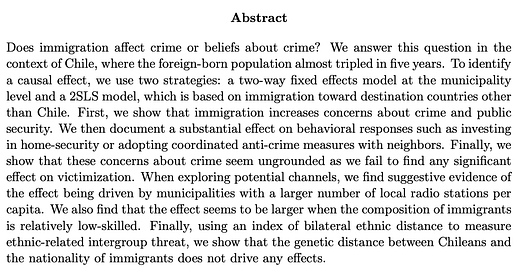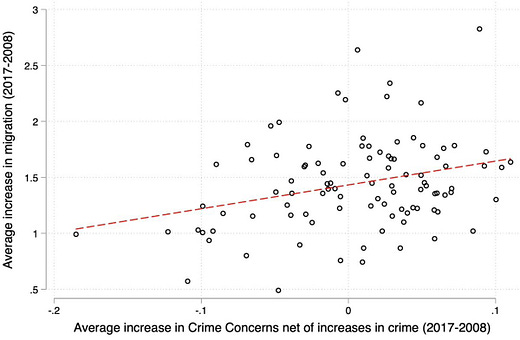Best of #econtwitter - Week of September 13, 2020
Sep 14, 2020
Welcome readers old and new to this week’s edition of the Best of Econtwitter. Recommendations always welcome over email or on Twitter @just_economics.
New papers

Mark Koyama@MarkKoyama
We revisit the classic argument that fractured geography was responsible for why Europe has been politically fragmented for most of its history in comparison to other parts of Eurasia, particularly (but not exclusively China).
3:59 PM · Sep 7, 2020
1 Repost · 8 Likes
^thread; amazing video of the simulation they run here

Pierre Azoulay@pierre_azoulay
Here is the key figure in the paper. Immigrant and Native-Born Entrepreneurship: Firm Size Distributions using all start-up firms in the US census data (2005-2010), for US-born and immigrant-founded firms. 1/2


Ian Hathaway @IanHathaway
"The findings suggest that immigrants act more as "job creators" than "job takers" and that non-U.S. born founders play outsized roles in U.S. high-growth entrepreneurship." @pierre_azoulay @bfjo @jdanielkim
https://t.co/G8V0cty7k4 https://t.co/HgNtSR0Wtf
2:30 PM · Sep 7, 2020
11 Reposts · 31 Likes
^a thread from another coauthor here

Hanno Lustig@HannoLustig
1/New WP: Governments face a trade-off between insuring taxpayers and bond investors. To keep the government debt risk-free, the (warning: finance lingo) beta of the government’s tax revenue has to be lower than the beta of spending. @SVNieuwerburgh @MindyXiaolan

1:40 AM · Sep 8, 2020
16 Reposts · 52 Likes

Klodiana Istrefi@KlodianaIstrefi
FOMC speeches reveal that a higher communication on financial stability concerns relates to a more accomodative monetary policy.
#FOMC #FederalReserve
New WP joint with @SestieriG and Florens Odendhal
publications.banque-france.fr
Fed Communication on Financial Stability Concerns and Monetary Policy Decisions: Revelations from Speeches

2:22 PM · Sep 7, 2020
16 Reposts · 33 Likes

Nicolas Ajzenman@Nicolas_Ajz
"Immigration, Crime and Crime (Mis)Perceptions" - New WP with @pdomingr and R. Undurraga
In a nutshell
Immigration:
1) Did NOT cause crime
2) Triggered crime-related concerns
3) Triggered crime-preventive behavior (installing alarms, etc)
link: papers.ssrn.com/sol3/papers.cf…


7:06 PM · Sep 8, 2020
102 Reposts · 282 Likes

Abhishek Nagaraj 🗺️@abhishekn
🚨🚨 New paper alert 🚨🚨
Very excited about new paper with @SayWhatYouFound title:
Improving data access democratizes and diversifies science
forthcoming in @PNASNews
with @esther_shears & @MathijsdeVaan (@BerkeleyHaas)
link: pnas.org/content/early/…
Thread 👇
pnas.org
Improving data access democratizes and diversifies science

11:27 PM · Sep 9, 2020
54 Reposts · 112 Likes

Caleb Watney@calebwatney
A really interesting new paper from @JamesBessen et al. on trends in industry disruption over time.
Contra the traditional narrative that displacement has been on the decline since the 70s, it finds that ~2000 was the inflection point.
papers.ssrn.com/sol3/papers.cf…

3:43 PM · Sep 11, 2020
15 Reposts · 26 Likes
Other paper summaries

Alan Fernihough@DiffusePrioR
“Understanding Persistence” by Morgan Kelly re-examines the historical persistence literature in economics from a spatial statistics perspective. I think the results are MASSIVELY important for social science more broadly so here is a thread on the matter (1/13) #EconTwitter

10:49 AM · Sep 9, 2020
143 Reposts · 394 Likes
^David Hilbert once claimed that the importance of a scientific work can be measured by the number of older works it makes obsolete; by this criterion, Kelly’s paper is up there

Matt Notowidigdo@ProfNoto
The paper has a lot of really nice figures showing the changing patterns of selection into unionization over many decades; e.g., figure below shows selection into unionization by education conditional on race. In recent years, education no longer predicts unionization status

8:56 PM · Sep 7, 2020
3 Reposts · 10 Likes

Cristiano Cantore@c_cantore
Our paper on the response of the #LaborShare to #MonetaryPolicy shocks is now out on @JEEA_News. Here is a thread to summarise the paper and reflect its publication journey. 👇1/n

JEEA @JEEA_News
Forthcoming article by @c_cantore Filippo Ferroni and Miguel León-Ledesma “The Missing Link: Monetary Policy and The Labor Share” @JEEA_News the Journal of @EEANews @OUPEconomics
https://t.co/7D4e34FL9j
3:14 PM · Sep 11, 2020
13 Reposts · 87 Likes
Announcements

Journal of Public Economics@JPubEcon
We're excited to announce the creation of a new Short Paper submission option at the Journal of Public Economics!
AERI rules apply, submissions are now open!
See details here:
journals.elsevier.com
Journal of Public Economics

6:00 PM · Sep 10, 2020
188 Reposts · 582 Likes
Good discussions and replies

Jan Kabátek@JanKabatek
Here's a bunch of @Stata tips for handling large datasets (millions of observations).
I wish I knew them when I was starting with admin data analysis...
5:50 AM · Sep 8, 2020
362 Reposts · 1.41K Likes

Andrew Lilley@andrewlilley_au
Some good news for JMCs on #EconTwitter. On a quick scrape of the AEA's job listings, the private sector seems to be holding at 90% of last year's listings at this point in time, and nonUS academic jobs are at ~65%.
(Bad news is that US academic jobs at ~35% as bad as expected).

4:18 AM · Sep 9, 2020
89 Reposts · 243 Likes
^…I don’t know if this is good news

Arnaud Dyevre@ArnaudDyevre
With friends at LSE, I recently had a reading group session in memory of Emmanuel Farhi. I discussed some of his influential papers on production networks with David Baqaee.
I thought I'd summarise this discussion here for people interested in this beautiful line of work 👇
12:45 PM · Sep 9, 2020
137 Reposts · 567 Likes

Ramya@ramyaar9
I’m crowdsourcing to create a list of PhD-level courses and office hours that are open to students around the world. Consolidating this data would help a number of prospective and current students.
#EconTwitter

Eva Vivalt @evavivalt
First day officially at the University of Toronto! I'd like to try something new to help provide advice and mentoring (and also manage requests). "Open office hours": An hour where anyone anywhere in the world can sign up for a twenty minute slot to chat about research.
11:20 AM · Sep 2, 2020
8 Reposts · 55 Likes

